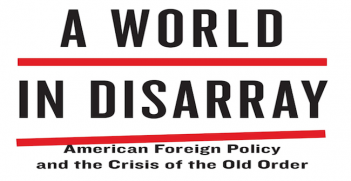Threats to a Rules-Based International Order

There is a broad consensus in the Western world that the rules-based order that has governed international relations for the past 70 years is under unprecedented strain. Where are the most serious threats coming from? How fundamental are they and how can they be dealt with?
Both the European Union and Australia are great believers in the rules-based order as the essential core of global governance. For the EU, multilateralism and a rules-based order is written into its DNA. As a Chatham House paper put it in 2015, the EU is “perhaps the most rules-based and rules-observant of all branches of the current international order.” For Australia, the rules-based order is embraced for more pragmatic reasons: a guarantee that the interests of mid-sized countries will not be ignored by the rival superpowers of the 21st century.
Distinguishing the threats
Are we talking about threats to a “liberal” rules-based order–which is seen as US-dominated, free market-oriented, and democracy-based order–or a rules-based order without the “liberal” tag?
While significant parts of the post-war rules-based order have long been dominated by a western-defined liberal agenda, including the WTO and the Bretton Woods institutions, the same cannot be said for all the agencies and elements of the UN system, which sought to balance the protagonists of the Cold War by granting vetoes in the UN Security Council to all five original nuclear powers including Russia and China. Russia and China may be keen to counter the excessive influence of the “West” in setting the international economic and human rights agenda, however they are equally determined to preserve a rules-based system in which they both enjoy vital vetoes.
Fears for the future of the rules-based order, and a determination to preserve it, have been expressed in the most recent UK and Australian security and foreign policy doctrines, as well as the EU Global Strategy. But different leaders have put a different emphasis on the sources of the threat. Some see it as coming from the rising nationalism of China, the revanchism of Russia, and the America First doctrine of President Trump. Others fear rogue states and non-state players. The threat of dramatic technological change, with an essentially unregulated cyber-space, is another key factor undermining a rules-based order.
In her speech at the Lord Mayor’s banquet in London last autumn, Theresa May declared that the rules-based system was in danger of being eroded and singled out Russia as the worst offender: “It is Russia’s actions which threaten the international order on which we all depend,” she said, citing the illegal annexation of Crimea, fomenting conflict in the Donbas, repeated violation of national airspace of several European countries and cyber espionage. The only other country mentioned by Mrs May was North Korea, along with non-state actors such as “Daesh and Islamist terrorism” in the Middle East.
Julie Bishop, Australia’s Minister for Foreign Affairs, also singled out North Korea and non-state actors as threats to the rules-based order when she addressed the UN General Assembly last September.
But neither she nor Mrs May dared to mention the man most responsible for the sharp increase in alarm in Europe and the Asia-Pacific about the sustainability of the rules-based order: US President Donald J. Trump.
As John Ikenberry puts it, “For the first time since the 1930s, the United States has elected a president who is actively hostile to liberal internationalism.” Ikenberry fears that the internal populist backlash in the western world – as expressed by the election of Donald Trump, the Brexit vote in the UK, and the rise of populist nationalism in countries such as Hungary, Poland, Turkey and the Philippines – is a greater threat to the rules-based order than revanchist Russia, nationalist China or the unpredictability of rogue states such as North Korea. If the architects of the system have lost faith in its capacity to deliver fair regulation, it is indeed sorely endangered.
Problems of the Rules-based International Order
A 2015 Chatham House paper singled out three interconnected problems of the rules-based international order: legitimacy, equity and complacency.
First, “rules must be visibly observed by their principal and most powerful advocates.” US legitimacy was undermined first by its invasion of Iraq, then further by the failure to close Guantanamo Bay; the US Senate report on the use of torture; the use of presidential authority to order lethal drone strikes on adversaries in the Middle East and Pakistan; and the exposure by whistle-blower Edward Snowden of illegal US espionage activities over the internet. “The danger today is that this questioning of US global leadership has opened the space for other countries to pursue a ‘might is right’ approach to their own policy priorities,” the paper concludes.
Equity is called into question if a rules-based order is perceived to work for a minority, and not the majority. The world economic order had always distributed benefits unequally, but the global financial crisis of 2008-9 had made the structural weaknesses of the system, and the unfairness of income distribution and austerity, much more apparent. That was particularly true in the European Union, where the backlash against austerity compounded dissatisfaction with EU migration policies. The rise of populist nationalism was one result.
As for complacency, it was found in the sheer success and longevity of the rules-based order as the “natural order of things” for seven decades. “Global free trade regimes, UN Security Council-sanctioned interventionism, human rights activism, and anti-censorship campaigns are elements of a transformative agenda being actively pursued by Western states and societies. What many in the West see as an attempt to spread the benefits of modernity is perceived elsewhere as an aggressive bid for dominance.” The backlash to the metropolitan liberal agenda has come not only from more conservative and authoritarian regimes abroad, but also from conservative electorates at home.
These three issues are serious but need not be fatal. Revision of the rules to ensure relevance and consistent application of the rules could help the survival of the rules-based order.
A deal-based order
Philip Shetler-Jones, international security programme leader at the World Economic Forum, warns about the substitution of a new “deal-based order” for the existing “rules-based order”. The huge transfer of economic power from west to east, and reduction in the relative dominance of the US and Europe, has seen the US become “less willing, and perhaps also less able, to perform the global policing role.” President Trump has made it clear that ’America First’ means reformulating alliance relations and trade deals “to give America a better deal”.
Even the Europeans are behaving in a deal-based, not rules-based way. Their deal with Turkey on restraining the refugee flow was a blatant deal: and almost certainly an illegal one.
Deals are by definition “narrow, bilateral and transactional”, says Shetler-Jones. They are more fragile, and compliance is much harder to monitor or enforce. Deals are less transparent and accountable, and they are more blatantly open to shaping by power dynamics.
Replacing a rules-based order with a deal-based order should be anathema to both the EU and Australia. But how can they avoid or prevent such a shift in behaviour? There lies the nub of their challenge.
Quentin Peel is an associate fellow with the Europe Programme at Chatham House. He joined the Financial Times in 1975, where he served as foreign editor and international affairs editor, among other roles.
This article is an edited version of a background paper prepared for the EU-Australia Leadership Forum Sectoral Policy Workshop on a Rules-Based International Order which took place on 26-7 April in Brussels. Quentin Peel and Carl Ungerer were co-chairs of this dialogue. The AIIA is part of the international consortium delivering this project.





